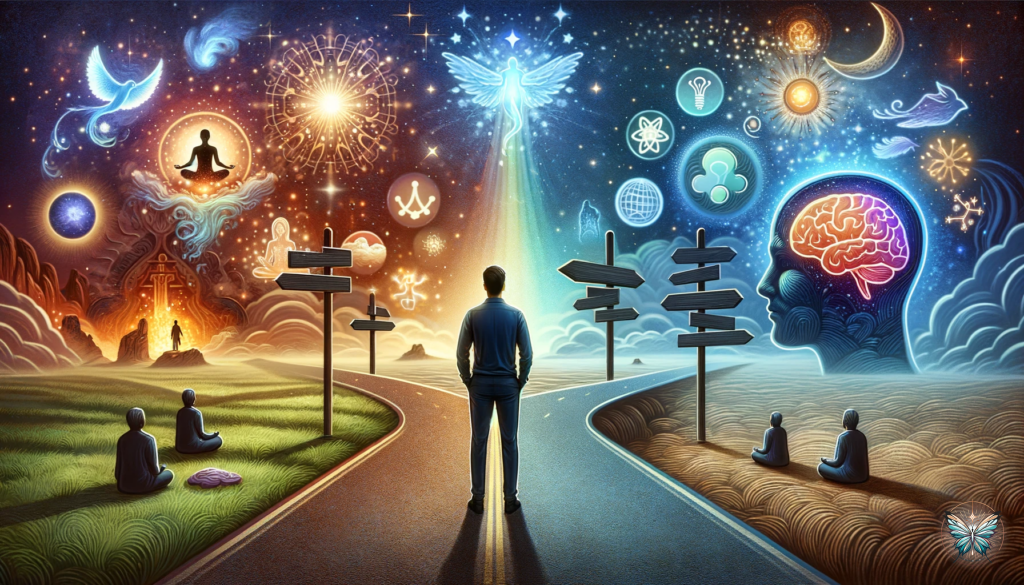Hello and welcome to Inspirited Nudges. Today, we’re embarking on a journey to understand the delicate interplay between our spiritual experiences and mental well-being. We’ll explore the realms of spiritual abandonment and crisis, and how to differentiate these from mental health issues. Whether you’re feeling lost on your spiritual path or facing an inner turmoil, this post is for you. Let’s dive in.”
Understanding Spiritual Abandonment

Let’s begin with spiritual abandonment. It’s a term that might sound stark, but it’s an experience that’s both deep and profound. It’s like walking a path you’ve known your whole life, only to suddenly find yourself in unfamiliar territory, without a map. The spiritual connection that once felt so real and tangible now seems distant, or even non-existent.
When you feel spiritually abandoned, it’s like you’re in a void where once there was a comforting presence. Leading to feelings of loneliness, doubt, and a reevaluation of spiritual beliefs. This feeling of disconnection doesn’t diminish your spiritual worth or journey. It’s a phase that invites deep introspection and can lead to a renewed and stronger spiritual connection.
It is, however, important to recoginze that spiritual abandonment can be a component or a trigger of a spiritual crisis.
Exploring the Depths of a Spiritual Crisis

A spiritual crisis, on the other hand, encompasses a wider spectrum of your spiritual journey. It’s not just about feeling abandoned or disconnected; it’s a radical questioning and upheaval of everything you believe in. You might find yourself questioning the purpose of life, the existence of suffering, or the nature of the divine.
This could be triggered by life events, inner conflict, or a search for deeper meaning. It’s like standing at a crossroads, with every direction leading to more questions and uncertainties. This crisis can be both terrifying and enlightening, as it forces you to confront fundamental truths about your existence. You may experience intense emotions, from deep despair to overwhelming peace.
Though challenging as it is at the time, there is a positive outlook, a spiritual crisis can result in a powerful catalyst for growth. It can propel you to explore those profound questions leading you to a more authentic understanding of your spirituality.
Use this time for self-reflection. What do these experiences teach you about your beliefs, values, and spiritual desires?
Reach out for support if you need it. This could be through spiritual communities, friends, family, or professionals who can provide guidance.
Every challenge on your spiritual path is an opportunity to learn, grow, and emerge stronger. These experiences often lead to a deeper and more authentic connection with your spirituality.
Distinguishing Between Spiritual Experiences and Mental Health Issues

This brings us to a crucial junction: the intersection of spirituality and mental health. How do we differentiate between a spiritual crisis and a mental health issue? It’s not always straightforward. Both can involve deep emotional distress, existential questioning, and changes in perception.
A critical aspect of our journey is understanding the distinction between a spiritual experience and a mental health crisis. While both can involve intense emotional upheaval, there are key differences. A mental health crisis often includes sustained changes in daily functioning. This might look like prolonged mood disturbances, significant changes in sleep or appetite, or a persistent inability to cope with routine tasks. In contrast, spiritual experiences, even challenging ones, usually don’t disrupt your basic ability to function in your daily life.”
The key here is to observe the impact on your daily functioning. If your spiritual experiences are causing significant distress, impairing your ability to function in daily life, or leading to isolation, it’s important to consider seeking professional help. Experiencing a crisis is not a weakness; rather, it’s a part of the complex tapestry of our human experience. And sometimes, part of navigating that experience is seeking help – not just spiritually, but psychologically.
Seeking Help and Self-Help Strategies

Where to seek help? It’s crucial to find the right support. If you’re struggling to differentiate between a spiritual experience and a mental health issue, a good starting point is talking to a mental health professional such as a psychologist, psychiatrist, or licensed counselors. Especially if you find one is open to discussing spirituality and incorporating your beliefs as part of the healing process. Additionally, spiritual leaders or communities can offer guidance, but ensure they approach your spiritual experiences with empathy and understanding.
Let’s talk about self-help strategies. Practices like meditation and journaling are more than just coping mechanisms; they’re tools for introspection. They can help you gain insights into whether your experiences are primarily spiritual explorations or signs of psychological distress. These practices encourage mindfulness and self-awareness, allowing you to better understand the nature of your experiences and when it might be time to seek professional help. Engaging in grounding activities like nature walks or mindfulness exercises can be highly beneficial. These practices offer clarity and help maintain a connection with your spiritual path, especially while navigating these challenging times.
The Role of Spirit Guides in Your Journey
Spirit guides are seen as mentors or helpers on our journey. But what happens when these guides seem to step back, especially during our toughest times? This perceived absence is often a significant part of both spiritual abandonment and crisis.
During times of spiritual abandonment, you might feel as if these guides have left you, adding to the sense of isolation. However, in the context of a spiritual crisis, they might be challenging you, pushing you towards growth and deeper understanding. Your relationship with your spirit guides can be a significant part of both experiences, influencing how you perceive and navigate these spiritual challenges.
Understand that these perceived absence during times of spiritual abandonment or crisis doesn’t mean they’re not with you. These experiences might be an integral part of the guidance process, encouraging you to develop inner strength and wisdom. Whether your guides are external entities or symbolic of your inner wisdom, their role is to support your spiritual growth, even through challenging times. Even if it doesn’t always feel like it.
If you want to know more about spirit guide separation we cover it in greater detail in “Embrace the Silence: Understanding Spirit Guide Separation in Our Spiritual Journey“.

Embrace the Journey
Remember, as you navigate your spiritual path, it’s essential to embrace the full spectrum of experiences. Challenges like spiritual abandonment or crisis are not just obstacles; they are opportunities for growth and learning. They invite us to deepen our understanding and connection to our spirituality and ourselves. Embracing these experiences with an open heart and a willingness to seek help, be it spiritual or psychological, is key to navigating them successfully.”
Thank you for joining us today on Inspirited Nudges we’d love to hear your thoughts or experiences related to today’s topic. Feel free to reach out or leave a comment. Until next time, keep exploring, and stay connected.

